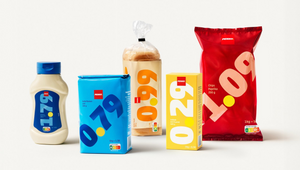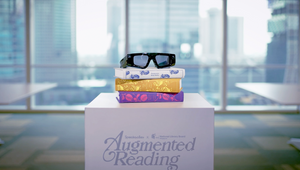
Heineken Harnesses What’s Uniquely Korean to Open ‘Trust Bars’ for UEFA Champions League Fans

What makes watching huge sports tournaments so special? Ask most fans and they'll likely mention the action, their favourite players and the intensity of the matches. But it's more than that – it's the shared excitement of watching it unfold with friends and fellow fans who are just as passionate about the game as you are.
In Seoul, where UEFA Champions League matches fall at 4am, that communal experience can’t easily happen – bars are closed, staff are off duty, and most of the city is asleep. For Heineken and LePub Singapore, this dilemma led to the idea of ‘Trust Bars’.
Rooted in South Korean culture and behaviour, ‘Trust Bars’ harnesses the community’s high social trust level and familiarity with technology to open self-serve bars where football fans can gather, pour, and connect, no matter the hour.
To unpack how this idea came together, LBB’s Sunna Coleman interviewed Stephan Schwarz, executive creative director at LePub Singapore.
LBB> For ‘Trust Bars’ to work, you needed the perfect conditions – high levels of trust and familiarity with self-service technology. Tell us about the insights from Korean culture, Seoul in particular, and what made it the perfect place to trial this.
Stephan> South Korea is one of the most trusting and safe countries in the world: leaving belongings unattended in cafés is an everyday occurrence; the crime rate is low compared to other industrialised countries. Daily observations confirm that people routinely leave laptops, phones, and wallets unattended in cafés, restaurants, and parks. Where else in the world are mobile phones not attached to the table in retail stores?
And then there is another aspect that guided our choice: Koreans are already accustomed to a self-service culture in their everyday lives, shopping from self-service kiosks. Contact-free customer experiences are becoming so commonplace that there’s even a word for it: ‘untact’.
LBB> Was the idea straightforward from the start or were there different iterations before you landed on the final concept? If the latter, can you tell us how the idea developed and changed?
Stephan> Last year, Heineken created ‘LaundroMatch’, an experience that allowed hardcore football fans in South Korea to watch Champions League games together, in the only places that were open 24-hours a day.
This year, we set out to further expand on this by creating something truly rooted in Korean culture and habits. The original idea is the one that was executed. Trust is a cultural currency in South Korea and the local Heineken team embraced the concept from the first meeting onwards.
LBB> What were the brand and business challenges you were looking to address?
Stephan> Korean football fans were basically stuck – they're incredibly passionate about Champions League football, but because of the time difference, matches kick off at four or five in the morning, when everything's closed. Bar owners can't afford to keep their doors open with full staff at those hours – the labour costs don't make sense for what would typically be dead time.
From Heineken's perspective, we saw an opportunity on multiple fronts. We wanted to cement their position as the go-to beer for football fans throughout the entire season. Plus, there was this whole lost revenue opportunity: if we could figure out how to keep bars open during those ‘dead hours’, bar owners could turn a profit while giving fans the social experience they were craving.
It was really about solving a timing problem: fans couldn't watch with friends, bars were missing out on revenue, and Heineken was losing potential customers to all-night convenience store beer runs.
LBB> What technical obstacles did you face along the way and how did you overcome them?
Stephan> In collaboration with LeGarage, LePub's innovation hub, we created self-service terminals that could be easily installed, making it simple to scale the experience to as many bars as possible.
The whole payment system was designed to be super user-friendly: just tap your card or phone and you're good to go. No fumbling around with cash or complicated interfaces when you're trying to watch a match at four AM. We really wanted to make the entire experience as smooth as possible, from verification, to payment, to getting your beer.
Of course, we couldn't just leave the taps wide open for anyone to use; we needed age verification. We built in biometric checks and FIDO authentication to ensure that only people of legal drinking age could access the system. Think of it like using your fingerprint or face ID, but for buying beer. The taps themselves are actually locked and designed to encourage responsible drinking, with limits on how much can be ordered per person.
LBB> How were the bars that took part selected?
Stephan> We put a lot of thought into the bar selection process because location and accessibility were absolutely crucial for this to work. We started by mapping out areas with good public transport connections during those early morning hours – there's no point having a Trust Bar if fans can't actually get there safely. Seoul's public transport system is fantastic, but we still needed to make sure we were choosing spots that were genuinely accessible when the matches were on.
Fortunately, we had a pretty extensive network to work with. Heineken has relationships with hundreds of bars across Seoul that already serve our products – whether that's our classic Heineken or our alcohol-free H 0.0 option.
The real work was in the curation process. We needed bars that weren't just willing to participate but were genuinely excited about pioneering something completely new. We were asking them to trust us with their space, their reputation, and their business model. It required bar owners who were innovative and forward-thinking.
What really surprised us was how enthusiastic the response was. We honestly thought we'd have to do a lot more convincing, but once bar owners understood the concept and saw the potential – both for additional revenue during dead hours and for being part of something groundbreaking – we had plenty of volunteers.
The bars that came forward were exactly the kind of partners we were hoping for: established, respected venues in prime locations with owners who shared our vision for what this could become.
LBB> What was the reaction to ‘Trust Bars’ – what reaction have you had from football fans and pub owners so far?
Stephan> I think one of the most telling moments in this entire journey was when we first presented ‘Trust Bars’ to the local Heineken Korea team. Their reaction was absolutely priceless – they were positively unimpressed but in the best possible way. There was this wonderful moment of silence, followed by what I can only describe as collective head-nodding. Here we were, presenting what we thought was this revolutionary, groundbreaking concept, and their response was essentially: "Why are we even discussing this? Of course, Korean fans are trustworthy enough to run their own bars."
We then began approaching pub owners across Seoul, who had been viewing the early hours as dead time – paying rent and utilities on spaces generating zero revenue during peak viewing hours for one of the world's biggest sports.
‘Trust Bars’ transformed their biggest liability into an asset, creating a new revenue stream from previously wasted hours while positioning them as hospitality innovators from March until the end of the Champions League season in May.
LBB> What are you most proud of on this project?
Stephan> What we're most proud of is that we managed to create something completely new by bringing together two things Korea does exceptionally well: their incredible culture of trust and their cutting-edge e-commerce technology.
We like to say we got ‘two birds with one tap’ – we gave football fans the social viewing experience they'd been craving while simultaneously solving the bar owners' biggest operational headache of keeping places open during expensive overnight hours.
The beauty of it is that neither solution would work without the other. Everyone wins, and it all works because we built it on foundations that were already solid in Korean culture rather than trying to impose something foreign.
LBB> Are there plans to roll this idea out to more countries? What adjustments might need to be made in order to do this and fit in with cultural norms across other locations?
Stephan> There are a few places in the world that have a similar combination of high social trust and tech-savvy consumers, which you absolutely need for this to work. Now that we have developed self-service Trust Bar terminals, we would still need to develop a unique approach for each country, based on their own technology, infrastructure and late-night service regulations. So we hope to expand ‘Trust Bars’ to other markets, but always by creating tailor-made experiences.















